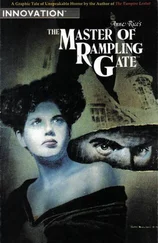I liked the bright orange color of yams. And please be assured, I was not proud of this diet, or seeking to write a magazine article on it. I’m simply tired of rich food; tired of crowded fashionable New York restaurants and glittering party buffets, and even the often wonderful meals offered me weekly by colleagues at their own tables. I am merely trying to explain. I wanted fuel for the body and the mind.
I brought what I needed so that I might write in peace. There was nothing that peculiar about all this.
The place was already lined in books, its old barn wood walls fully insulated and then shelved to the ceiling. There was a duplicate here of every important text I ever consulted at home, and the few books of poetry I read over and over for ecstasy.
My spare computers, all small and very powerful beyond any understanding I ever hope to acquire of hard drives, bytes, megabytes of memory, or 486 chips, had been delivered earlier, along with a ludicrous supply of diskettes on which to “back up” or copy my work.
Truth is, I worked mostly by hand, on yellow legal pads. I had cartons of pens, the very fine-point kind, with black ink.
Everything was perfect.
And I should add here that the world I had left behind seemed just a little more mad than usual.
The news was full of a lurid murder trial on the West Coast having to do with a famous athlete accused of slitting his wife’s throat, an entertainment par excellence that had galvanized the talk shows, the news shows, and even that vapid, naive, and childlike connection to the world that calls itself E! Entertainment.
In Oklahoma City, a Federal office building had been blown sky high—and not by alien terrorists, it was believed, but by our own Americans, members of the militia movement they were called, who had decided in much the same manner of the hippies of years before that our government was a dangerous enemy. Whereas the hippies and the protesters of the Vietnam War had merely lain on railroad tracks and sung in ranks, these new crewcut militants—filled with fantasies of impending doom—killed our own people. By the hundreds.
Then there were the battles abroad, which had become regular circuses. Not a day went by when one was not reminded of atrocities committed among the Bosnians and the Serbs in the Balkans—a region that had been at war for one reason or another for centuries. I had lost track of who was Moslem, Christian, Russian ally, or friend. The city of Sarajevo had been a familiar word to television-watching Americans for years now. In the streets of Sarajevo people died daily, including men they called United Nations peace keepers.
In African countries, people starved as the result of civil strife and famine. It was a nightly sight as common as a beer commercial to see on television fresh footage of starving African babies, bellies swollen, faces covered with flies.
Jews and Arabs fought in the streets of Jerusalem. Bombs went off; protesters were shot at by armies; and terrorists destroyed innocent people to strengthen their demands.
In the Ukraine, remnants of a fallen Soviet Union made war on mountain folk who had never given in to any foreign power. People died in the snow and cold for reasons that were nearly impossible to explain.
In sum there were dozens of places raging with suffering in which to fight, to die, to film, as the parliaments of the world tried in vain to find answers without bullets. The decade was a feast of wars.
Then there was the death of Esther Belkin, followed by the scandal of the Temple of the Mind. Caches of assault weapons had been found in the Temple’s outposts from New Jersey to Libya. Explosives and poisonous gases had been stockpiled in its hospitals. The great mentor of this popular international church—Gregory Belkin—was insane.
Before Gregory Belkin, there had been other madmen with great dreams perhaps but smaller resources. Jim Jones and his People’s Temple committing mass suicide in the jungles of Guyana; David Koresh, who believed himself the Christ, perishing by gun and fire in a Waco, Texas, compound.
A Japanese religious leader had just recently been accused of killing innocent people on the country’s public subways.
A church with the lovely name of the Temple Solaire had not so long ago staged a mass suicide coordinated at three different locations in Switzerland and Canada.
A popular talk show host gave directions to his listeners as to how they might assassinate the President of the United States.
A fatal virus had only recently broken out with stunning fury in an African country, then died away, leaving all thinking individuals with a renewed interest in the age-old obsession: that the end of the world might be at hand. Apparently there were more than three kinds of this virus, and numerous others equally as deadly lurking in the rain forests of the world.
A hundred other surreal stories made up each day’s news, and each day’s inevitable civilized conversation.
So I ran from this, as much as anything else. I ran for the solitude, the whiteness of snow, the brutal indifference of towering trees and tiny winter stars.
It was my own Jeep which had brought me up through “the leather stocking woods,” as it is sometimes still called, in honor of James Fenimore Cooper, to barricade myself for the winter. There was a phone in the jeep by which one could, with perseverance if possible, reach the outside world. I was for tearing it out, but the truth is I’m not very handy and I couldn’t get the thing loose without damaging my car.
So you see, I am not a fool, just a scholar. I had a plan. I was prepared for the heavy snow to come, and the winds to whistle in the single metal chimney above the round central hearth. The smell of my books, the oak fire, the snow itself whirling down at times in tiny specks into the flames, these things I love and need now and then. And many a winter before this house had given me exactly what I asked of it.
The night began like any other. The fever took me completely by surprise, and I remember building up the fire in the round pit of a fireplace very high because I did not want to have to tend it. When I drank all the water nearest the bed, I don’t know. I couldn’t have been fully conscious then. I know that I went to the door, that I myself unbolted it, and then could not get it closed; this much I do recall. I must have been trying to reach the Jeep.
Bolting the door was simply impossible. I lay for a long time in the snow itself before I crawled back inside, and away from the mouth of the winter, or so it seemed.
I remember these things because I remember knowing then that I was very much in danger. The long journey back to the bed, the long journey back to the warmth of the fire, utterly exhausted me. Beneath the heap of wool blankets and quilts, I hid from the whirlwind that entered my house. And I knew that if I didn’t clear my head, if I didn’t recover somehow, the winter would just come inside soon and put to sleep forever the fire, and take me too.
Lying on my back, the quilts up to my chin, I sweated and shivered. I watched the flakes of snow fly beneath the sloping beams of the roof. I watched the raging pyramid of logs as it blazed. I smelled the burnt pot when the soup boiled dry. I saw the snow covering my desk.
I made a plan to rise, then fell asleep. I dreamed those fretful stupid dreams that fever makes, then woke with a start, sat up, fell back, dreamed again. The candles were gone out, but the fire still burned, and snow now filled the room, blanketing my desk, my chair, perhaps the bed itself. I licked snow from my lips once, that I do recall, and it tasted good, and now and then I licked the melted snow I could gather with my hand. My thirst was hellish. Better to dream than to feel it.
Читать дальше








